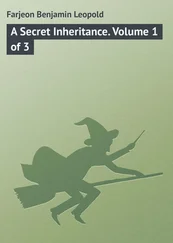Benjamin Farjeon - London's Heart - A Novel
Здесь есть возможность читать онлайн «Benjamin Farjeon - London's Heart - A Novel» — ознакомительный отрывок электронной книги совершенно бесплатно, а после прочтения отрывка купить полную версию. В некоторых случаях можно слушать аудио, скачать через торрент в формате fb2 и присутствует краткое содержание. Издательство: Иностранный паблик, Жанр: foreign_prose, на английском языке. Описание произведения, (предисловие) а так же отзывы посетителей доступны на портале библиотеки ЛибКат.
- Название:London's Heart: A Novel
- Автор:
- Издательство:Иностранный паблик
- Жанр:
- Год:неизвестен
- ISBN:нет данных
- Рейтинг книги:4 / 5. Голосов: 1
-
Избранное:Добавить в избранное
- Отзывы:
-
Ваша оценка:
- 80
- 1
- 2
- 3
- 4
- 5
London's Heart: A Novel: краткое содержание, описание и аннотация
Предлагаем к чтению аннотацию, описание, краткое содержание или предисловие (зависит от того, что написал сам автор книги «London's Heart: A Novel»). Если вы не нашли необходимую информацию о книге — напишите в комментариях, мы постараемся отыскать её.
London's Heart: A Novel — читать онлайн ознакомительный отрывок
Ниже представлен текст книги, разбитый по страницам. Система сохранения места последней прочитанной страницы, позволяет с удобством читать онлайн бесплатно книгу «London's Heart: A Novel», без необходимости каждый раз заново искать на чём Вы остановились. Поставьте закладку, и сможете в любой момент перейти на страницу, на которой закончили чтение.
Интервал:
Закладка:
"Nothing farther. You can go."
The old man lingered as though he were wishful to say a word to Felix; but that young gentleman, standing with his back to him, gave him no opportunity, and he left the study in silence. Then the Reverend Emanuel Creamwell rose and, paced the room, indulging in bitter meditations. It had been an unfortunate afternoon for him; everything but this last small triumph had gone wrong with him; he had been crossed, almost defied, at every turn. First, his son; then, this presumptuous old man, whose words were still burning in his mind. And his son's silence now irritated him. Every moment added to his irritation. Felix, standing with his face to the window, looking out upon the churchyard, and upon the figures of the old man and his grandchildren walking towards the grave, showed no disposition to move or to speak. In the eyes of his father this implied disrespect. He was not destitute of a certain decision of character, and in harsh tones he called upon Felix, to speak.
"I have been considering, sir," said Felix. "I ask your pardon for keeping you waiting."
"Considering what?" demanded the Reverend Emanuel Creamwell.
"The proposition you made to me before these persons intruded upon us. You offered me a shelter here, until I determined upon a profession.
"On the express understanding that you conform to my rules."
"I do not forget, sir. Those were your very words. Will you permit me?" He took from the table the document which had been referred to in the conversation that had lately taken place. "And this old man has been all his life paying a debt for which he was not liable! There is hope yet for human nature, sir." A queer smile came upon his lips as he uttered these words in a half-gentle, half-bantering tone.
"Speak plainly," was the stern rejoinder of the Reverend Emanuel Creamwell.
"I will try to do so. My uncle left a request that all his papers should be burnt, and I am my uncle's heir. Why was this preserved?"
"You have heard: for your good. It is worth money to you. The man admits the claim."
"Money!" exclaimed Felix, with a light laugh, in which there was bitterness: "But the dead must be obeyed."
He went to the fireplace, struck a match, and applied the light to the paper. The Reverend Emanuel Creamwell, with face white with anger, watched the burning of the paper. Felix let the ashes fall into the fender, and tapped his fingers lightly together, with the air of one wiping away a soil.
"So!" he said. "I wash my hands of that."
"You know what you have done?" said the Reverend Emanuel Creamwell, placing his hand upon the table to steady himself.
"Yes, sir," answered, Felix gravely; "I shall never trouble you again."
Then he left the room quietly and sadly.
CHAPTER XI
FELIX, DISSATISFIED WITH THE REALITY, SETS UP AN IDOL, AND WORSHIPS IT
In the passage Felix was confronted by the colourless housekeeper. He had a kindly feeling for her. She had been his father's housekeeper ever since he could remember. She was a young woman and well-looking when he was a little child. When he came home, a man, she had addressed him in the old familiar way, and he was surprised at the change in her; but he soon recognised that living all her life within the influence of his father's house had made her what she was. Now, as, she confronted him, he gave her a kind nod, and would have passed her: but she laid her hand upon his arm to detain him.
"Where are you going?" she asked.
"Into the churchyard," he answered.
"Where, after that?"
"A subtle question, Martha. Who knows where he goes to after he gets into the churchyard?"
"Where, after that?" she repeated.
"Ask the worms," he replied; and added, somewhat bitterly, "or the preachers."
"Answer me, Felix," she said.
"I can't;" and again he attempted to pass her.
"Nay," she said, almost entreatingly; "let me speak to you for a minute or two."
"Come outside, then; I cannot speak to you here."
She followed him into the porch. The chair which he had brought for Lily was there, but Lily was gone. The fragrance of the scented water he had sprinkled upon his handkerchief lingered in the air. He placed his hand upon the chair, and in his fancy the sweet air became associated with the tender girl who had rested there awhile ago. He smiled, half gladly, half sadly, as the fancy came upon him. The housekeeper watched him earnestly, as if striving to read his thoughts.
"Now, Felix, where are you going afterwards?"
"I can't tell you, Martha," he replied-softly, for he was thinking of Lily. "My plans are unformed."
"When do you return?"
"Never; unless something dearer than life brings me back."
"You have had a quarrel with your father?"
"You are a witch," he said lightly, "and ought to be burnt."
"You have had a quarrel with your father," she repeated, showing no temper at his light manner, but even seeming to take pleasure in it.
"Something like that. We don't agree. There are not two rights, are there, Martha?"
"I am not sure; there may be."
"I am sure. My father's right and mine are as the north and the south pole. If I am right, I must not stay here and vex him: it would be unfilial. If he is right, I must sit in sackcloth and ashes, and pray for fresh blood and bone and brain before we can meet again. Any way I must go; that is settled."
"Who settled it?"
"He, or I, or both of us. Are you not witch enough to guess for yourself? It came, somehow. That is enough. If you entertain the idea that the difficulty is to be smoothed over – "
"I do not," she interrupted. "I know your father."
"And me-do you think you know me?"
"I think I do."
"Therefore you must see how impossible it is that he and I, having disagreed upon a vital point-it is vital, to my thinking-can live together. I have a fancy in my head, Martha; I'll tell it to you. To have a father and not have a father-as is the case with me-is dreadful. For father and son to disagree is dreadful also. So I shall imagine a father, and as he is sure to agree with me, we shall be the best of friends. I shall picture him tender, and good, and kind; tolerant, yet conscientious; merciful, yet just. I can see him, and I love him already!"
Light as his words were, there was a vein of seriousness in his tones that showed how deeply his feelings had been stirred.
"When I left the Continent," he continued, "I had a friend with me who also had been absent from home for years. At intervals during our journey, he spoke with enthusiasm of home delights and of the happiness in store for him when he and his family came together. He showed me letters from them which made me think. We crossed from Paris to Dover, and there he met his father, who had travelled a hundred miles to welcome his son the moment he set foot on English soil. They threw their arms round each other, like boys, and laughed to keep away the tears. When I came to the railway station here-just half a mile from where we stand-I looked about me with a dim hope that my father had come that distance to welcome his son home. But there are fathers and fathers, Martha. Now, if I had been wise, and had set up my imaginary father before the train stopped, I should have seen him waiting for me on the platform; I should have been able to throw my arms round his neck, to press him to my heart, and to see in his eyes a kindly welcome; I should have been able to grip his hand, and to say, 'Bravo, dear old fellow! I love you!' But I was not wise, and to be forewarned by my fears was not with me to be forearmed. It is not too late, though-it is never too late. Away, you shadows!"
He flicked his handkerchief in the air, as if the reality oppressed him with a phantom presence, and said in a mock-serious tone, in which earnestness struggled not vainly for a place:
Читать дальшеИнтервал:
Закладка:
Похожие книги на «London's Heart: A Novel»
Представляем Вашему вниманию похожие книги на «London's Heart: A Novel» списком для выбора. Мы отобрали схожую по названию и смыслу литературу в надежде предоставить читателям больше вариантов отыскать новые, интересные, ещё непрочитанные произведения.
Обсуждение, отзывы о книге «London's Heart: A Novel» и просто собственные мнения читателей. Оставьте ваши комментарии, напишите, что Вы думаете о произведении, его смысле или главных героях. Укажите что конкретно понравилось, а что нет, и почему Вы так считаете.












